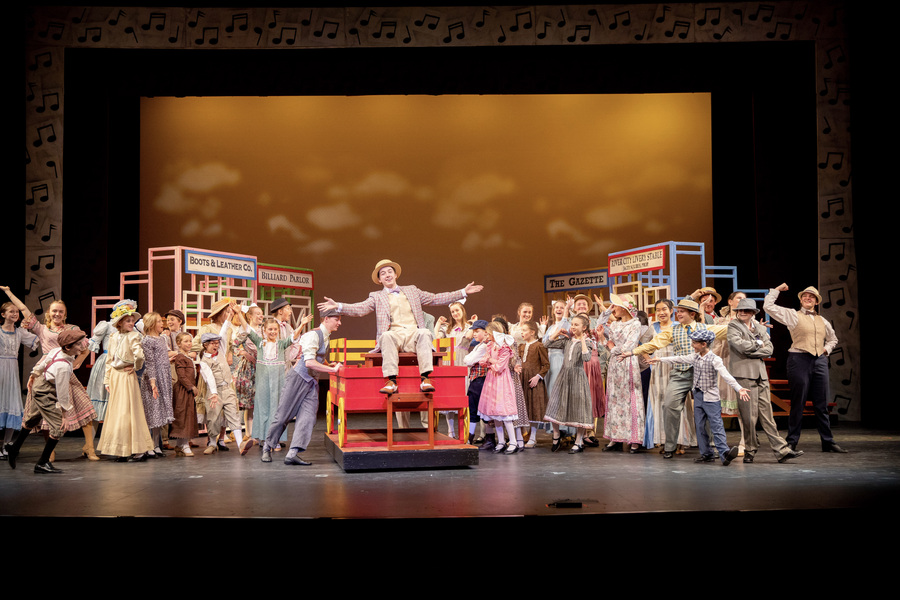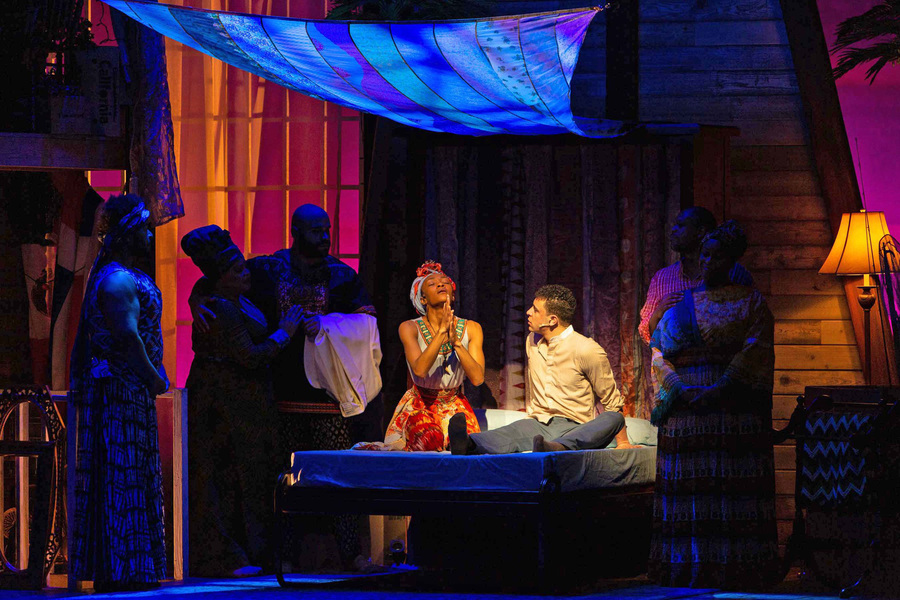The Rockies know how to stand together in severe climates. That’s true of the region’s theatres as well, as four organizations I spoke to talked about advocating on behalf of their employees as well as their audiences in the midst of a global pandemic and various phases of lockdown. When theatres reopen, whether next month or next year, these companies plan to still be here, helping those on either side of the footlights realize the value of shared experiences even more.

Denver’s Phamaly Theatre Company is constantly changing. The disability-affirmative theatre began life in 1989 as PHAMALy (Physically Handicapped Amateur Musical Actors League), and has continually remolded itself to accommodate different artists with different kinds of disabilities.
“Adaptation is our general approach,” said artistic director Regan Linton. “Our first response to this pandemic was: How do we adapt?”
Back in February, a week after its production of the musical Honk! left Japan to return to the United States, everything started to shut down. Phamaly postponed and canceled a number of its programs, including a summer musical adaptation of Alice in Wonderland. The company is using the forced hiatus to explore different plays and playwrights through online virtual readings, with 14 of them scheduled for July and August. It is currently working on creating a webathon, a cabaret variety show it plans to livestream in October.
“If there’s anything that this pandemic experience has reminded us, it’s how hard it is for us to be disconnected as human beings,” Linton said. “I think that’s actually a really good sign for theatre.”
Phamaly’s mission is to be a creative home for theatre artists with disabilities, and to create a world in which differences are celebrated and the theatre experience is accessible and welcoming to all, including those who are unable to physically attend live theatre.
“The heightened virtual experiences which we’re all having right now are just helping us to get creative about how we can build a more hybrid environment so that we can continue to use those virtual formats to be more accessible,” Linton said, “but also give people the opportunity to come back into a space and get that life-affirming human connection that theatre brings.”
Phamaly went through some significant financial issues a few years ago, Linton said, but is in a stable spot right now. Though the summer musical was canceled, the artists working on it were still offered full contracts.
“There’s a reason that theatre survived for thousands of years as a way of storytelling and making meaning from life,” Linton said. “Theatre will continue on.”

When the pandemic swept across the country, Off Square Theatre Company in Jackson, Wyo., had just wrapped up its annual youth musical, was in preproduction for its outdoor summer Thin Air Shakespeare production, and was getting ready to host a visiting group of students for a one-week residency program. The last two initiatives were canceled.
“We chose not to move our productions online if we weren’t going to have it live,” said artistic director and resident producer Natalia Duncan Macker. “Outdoor Shakespeare is very reliant upon having an audience to be successful.”
Off Square instead has been offering virtual material, including a playwriting program, a monologue master class, comedic scene study, and a dialect workshop. It also hopes to provide an in-person version of The Thanksgiving Play by Larissa FastHorse this November, along with a real-time virtual experience.
Macker, who also serves on the board of county commissioners in Teton County, Wyo., said the theatre’s conversations have been about finding the right balance of where to put its resources so that the impact will be the strongest. “I spend a lot of time thinking about how we build community and what the components of strong communities are,” she said. “Artists are very important community members.”
Off Square did not lay off any members of its organizational staff, but the artists in its canceled productions did lose those jobs. The theatre also applied for all the opportunities that have been made available through the CARES Act.
Working in an isolated and rural state like Wyoming has helped Macker see the theatre industry through the lens of smaller companies that are running on fumes. “I’m optimistic about the long-term future, but I am concerned about the short-term future,” she said, referring to Off Square and other small theatres. “It’s really important that we don’t lose those places.”

Chris Massimine, managing director at Pioneer Theatre Company in Salt Lake City, Utah, believes that the pandemic and the Black Lives Matter protests have made this a good time to rethink what Pioneer is as an organization, how it can best serve its community, what steps it can take to become a better champion of diversity and inclusion, and how to prepare for a world after COVID-19.
Pioneer was in the middle of its world premiere of an Ellen Simon play called Ass when it abruptly shut down. Massimine, who is in his first year as managing director, said he looked at the company’s resources and negotiated with contractors and vendors to make sure it was running as leanly as possible.
The theatre now hopes to reopen in February. “Aside from doing the logical things and following a crisis management plan, we’re also following our hearts,” Massimine said. “I think that’s important to maintain for the artist community.”
He is very proud that Pioneer has not let go of a single employee, which is one reason it will end this year with a slight deficit. “We started to furlough only when it was necessary,” he said, “so that was a part of our judgment, to make sure we were keeping people as long as we could.”

“I’ve only ever had, like, a 10-day break in my life,” said Charles Fee, who has been working as producing artistic director at Idaho Shakespeare Festival for the past 30 years. “To sit at home for several months is strangely interesting.”
The company, which uses a 760-seat outdoor amphitheater in Boise, usually mounts five productions between May and September. In March, when everything shut down, it had just begun rehearsals of Much Ado About Nothing, which would have opened May 22.
When we spoke in June, Fee said the company was working in partnership with local health officials, the mayor’s office, and Actors’ Equity to see if it can create a plan to be able to open its outdoor theatre in Boise later this summer.
Until then, Idaho Shakespeare Festival is sharing some virtual content—actors reciting speeches that they love, the education department creating some video for summer camps—but not livestreaming any of its past productions. “What we do is put live actors in front of a live audience in real time,” Fee said. “That’s the art form. I’d much rather watch Netflix than livestream theatre.”
He has absolute confidence that theatre will return to its former glory. After all, he said, one can watch professional basketball, baseball, or football from their own home on TV, complete with close-ups and instant replay, but whenever those teams play a home game, the stadiums are packed with people.
“The reason is the community,” Fee said. “You’re with other people.”
Utkarsha Laharia is a Goldring Arts Journalism graduate student at Syracuse University.
Creative credits for production photos: Once on This Island, book and lyrics by Lynn Ahrens, music by Stephen Flaherty, based upon the novel My Love, My Love by Rosa Guy, directed and choreographed by Gerry McIntyre, with music direction by Tom Griffin, scenic design by Daniel Meeker, costume design by Yoon Bae, lighting design by Driscoll Otto, sound design by Aaron Hubbard, wig design by Earon Nealey; A Midsummer Night’s Dream, scenic design by Bradley Scott, direction by Joseph Hanreddy, costume design by Rachel Laritz, lighting design by Rick Martin, sound design and music by Rob Milburn and Michael Bodeen, music direction by Joel Mercier


